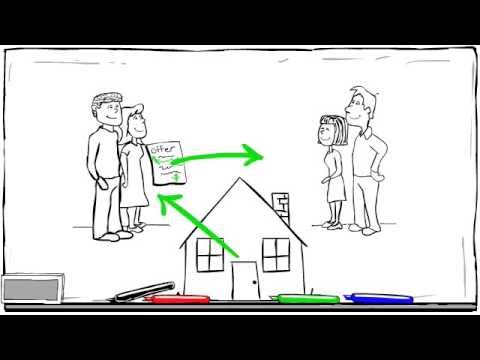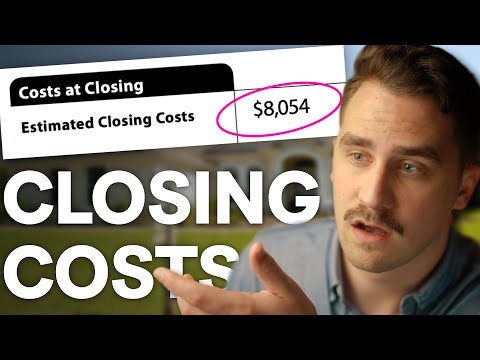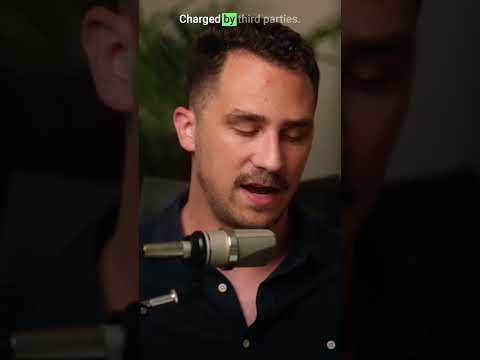Unveiling the Mystery of Closing Costs for Homebuyers
When you’re on the hunt for a new home, it’s as crucial to understand closing costs as it is to find that dream kitchen. Think of these costs as the finale of your home buying process—the last hurdle before you nab those keys.
Closing costs are the fees and charges aside from the purchase price of your home that you’ll pay to finalize a real estate transaction. On average, closing costs run about 3%–6% of your loan balance. But like a ghost in the attic, these costs can spook you if not anticipated.
A bunch of factors can cause your closing costs to swing higher or lower: your loan type, your home’s location, and even your negotiating skills. The truth is, the sticker price of your home isn’t the whole story, so when you go mortgage shopping, go eyes-wide-open about all costs involved.

The Anatomy of Closing Costs: What Fees Are Included?
Pour a cuppa, because we’re diving into the nitty-gritty of fees. Closing Costs are no pumpkin spice latte; they’re more like a strong black coffee—potent and complex. Here’s what’s on the menu:
Some of these fees might feel like they’re set in stone, but that’s not always the case. You can sometimes haggle the title services or play let’s-make-a-deal with lender fees. However, certain charges like recording fees or taxes are as fixed as the foundations of your potential new home.

| Category | Description | Typical Cost / Proportion of Home Price | Notes / Options |
|---|---|---|---|
| General Range for Closing Costs | Total expenses to finalize mortgage transactions. | 1% – 5% of the home purchase price for buyers; sellers may pay around 6% – 10%. | Costs vary by location, type of loan, and the property’s value. |
| Financing Closing Costs | Options to manage closing costs without immediate out-of-pocket payments. | N/A | – May increase loan amount or interest rate. – Some lenders offer no-closing cost loans, implicating higher interest rates over time. |
| FHA Closing Costs | Specific costs for FHA (Federal Housing Administration) loans on purchase. | Approximately 3% – 6% of loan balance. | – Can be financed by increasing the loan amount or interest rate. – Includes an upfront mortgage insurance premium. |
| Common Closing Costs Items | Frequently encountered fees and expenses during closing. | Varies | – Appraisal fees, attorney’s fees, and inspection fees. – Transfer taxes, broker fees, and legal fees in some areas. |
| New York City (NYC) | Closing costs particular to the NYC market for sellers. | 8% – 10% of the sale price. | Includes 6% broker fee, NYC & NYS transfer taxes (1.4% – 2.075%), legal, and possible building flip taxes and fees. |
| Minnesota | Expected closing costs in Minnesota. | Buyers: 2% – 5% of the agreement value. Sellers: 6% – 10% of the purchase price. |
Sellers generally pay the realtor fee which is a major component of their closing costs. |
| Payment Options | Ways to pay for closing costs. | N/A | – Can be paid in cash at closing. – Can be included in the loan amount, subjecting them to interest charges. |
| Seller Contribution | The amount a seller may contribute to the buyer’s closing costs. | Varies by loan type; frequently capped. | – Negotiable as part of the sales contract. – There are limits based on the type of loan (e.g., FHA, conventional). |
How Closing Costs Impact Your Real Estate Transaction
Closing costs can feel like a game of 3-D chess, affecting each move you make. They dictate not only your upfront expenses but also your home’s long-term affordability. Let’s say you’re looking at a haunted mansion—just kidding, a regular one—but the closing costs are through the roof. This might turn your dream home into a financial nightmare.
Consider two buyers, Alex and Pat. Alex’s closing costs are minimal, allowing a bigger budget for renovations, while Pat’s higher costs limit immediate personalization of the home. These differences significantly influence their home buying choices.

Estimating Your Closing Costs: A Buyer’s Guide
Now, some online tools can provide a ballpark figure of your closing costs. However, these are estimates; your actual costs can differ. How to finance FHA closing costs on a purchase loan? You could either up your interest rate for the lender to front the fees, or beef up your loan amount to cover them.
For specifics, look into tools like Mortgage Rater’s Closing calculator. Just be prepared that, like that plot twist in cinema 12, the final numbers might surprise you.

Strategies for Managing Closing Costs Before You Buy
Reducing your burden starts with research. Compare lenders and don’t shy away from negotiating fees. And remember, every penny saved is a penny that can go towards your life’s narrative—a chapter of financial savvy in your life story.
Let’s not overlook assistance programs that can ease your burden—think state, local government, and NGOs. They might make as much difference as a concerted effort on a lemonade stand, assuming you’re selling something like Mike ‘s Hard lemonade!

The Role of Lenders in Your Closing Costs
Not all lenders are created equal—some might offer a “no-closing-cost” option, where fees are baked into a slightly higher interest rate. Transparency is key here. Ask your lender to outline all necessary costs and how they might influence your monthly budget.
If you’ve enlisted a lender who’s a straight shooter, you’ll have a clearer financial portrait than if you were cracking open a mystery novel.
Regional Variations in Closing Costs Across the U.S.
You’d be mistaken to think that closing costs are a flat standard across the map—variations are as diverse as accents in a cross-country road trip. New Yorkers might shell out between 8% to 10% in seller closing costs, while Minnesotans see buyer costs around 2%–5%. Like regional weather patterns, these costs are influenced by local economic climates and laws.
Closing Costs for Different Types of Properties
Closing costs know no discrimination — they tweak their numbers based on property type. For example, new constructions might pack on extra fees for inspections or building permits. Buying a condo? You might be facing additional HOA-related charges.
So, like picking a Halloween costume, you have to consider all the angles before making your choice.
Closing Costs and Negotiation: Tips for Homebuyers
Just like wheeling and dealing at a car dealership, you can negotiate your closing costs. You’ve got to be bold but informed. Maybe the seller will agree to cover some of it, or you could look into a no-closing-cost mortgage, where fees are subtly included in the interest rate, much like a secret ingredient in a gourmet dish.
Gather insider tips, like a Co-borrower on the loan to split the fees, or perhaps purchasing a collateral to shave down the expenses. Inspiration can come from anywhere – who knows, maybe even Olivia Rodrigo’s dating tactics!
Future Forecast: Closing Costs Trends to Watch
Buckle up; the realm of closing costs is as dynamic as the stock market. Trends show that as markets heat up, these costs could rise, just like the crescendo in a blockbuster movie. Projections suggest a lean towards simplified, digital processes, likely to reduce some administrative fees.
However, much like fashion trends, these forecasts are not set in stone. Keep an eagle eye on the housing market’s shifts and shakes.
Conclusion: Navigating Closing Costs With Confidence
Let’s land this financial plane. Closing costs aren’t just small print or a pesky afterthought—they’re a significant part of the homebuying story. It’s vital to understand their anatomy, negotiate like a pro and manage them like an expert.
So, take the wheel, navigate these waters with precision, and you’ll dock your ship harbor-side, ready to revel in the joys of homeownership. Carry these tips in your arsenal, and you’ll not just survive the closing cost jungle, but you’ll emerge a champ, ready to tackle your next challenge with gusto.
The Lowdown on Closing Costs: Fun Facts and Trivia
Buying a house isn’t just about picking out your dream kitchen and imagining your furniture in the living room; there are tons of details that can make your head spin! And let’s not forget about closing costs – those extra fees that sneak up on you like the plot twist in your favorite mystery novel. Get ready for some jaw-dropping facts and trivia that’ll make you the savviest homebuyer on the block.
Did You Know?
Hold onto your hats because the world of closing costs is as varied and surprising as the latest celebrity gossip. Speaking of surprises, did you know that who Is Olivia rodrigo dating is probably easier to answer than figuring out exactly how much you’ll pay in closing costs? But don’t worry; we’re here to help clear the fog!
Closing Costs: The “Hidden Track” of Homebuying
Just like discovering a hidden track on your favorite album, closing costs can feel like a secret bonus (or penalty) when buying a house. They’re the mandatory encore you didn’t see coming, and they typically range from 2% to 5% of the purchase price. So, if you’re splurging on a $300,000 house, you could be shelling out an extra $6,000 to $15,000 – enough to make anyone’s wallet sing the blues.
The Who’s Who of Closing Costs
Now, let’s jam out to the who’s who in closing costs. You’ve got your lender fees, your title insurance, attorney fees (because, let’s face it, you don’t want any legal discord), and even pest inspections – because the last thing you want is some critters crashing your housewarming party!
The Art of Negotiation: A Duet with the Seller
Guess what? In the real estate concert, sometimes the seller can pitch in on your closing costs. It’s like a duet where both parties hit the high notes together. But keep in mind, it’s all about how you negotiate that sweet melody. So, strum up your best bargaining skills and you just might get a crowd-pleasing deal.
A Little Known Secret: Location, Location, Location!
Here’s a fun tidbit for you – closing costs aren’t just about the house; they’re also about where it’s located! Imagine if you could set your closing costs like you set your favorite radio station. Some states are like that easy-listening station with lower fees, while others are like that station with all the commercials that seem to go on forever.
Don’t Skip the Encore
You might be tempted to skim over the details of closing costs, but let’s face it, that would be like walking out before the encore of the best concert of your life. You never know what kind of surprises you could miss! And while we’re on the topic of surprises, did you know there’s a buzz about “who is Olivia Rodrigo dating? Now, that’s a plot twist that could rival the surprise of unexpected closing costs!
Closing costs may not be the headliner of homebuying, but they’re definitely a part of the main act. So, dive deep into these facts and don’t let them catch you off-guard. With this trivia under your belt, you’re set to hit the high notes of homebuying without missing a beat!

Can closing costs be included in loan FHA?
Sure thing! Here’s a quick answer for each of your questions:
How are closing costs calculated in NY?
Oh, absolutely! Closing costs can be rolled into an FHA loan, but hey, don’t forget you’ll need enough equity if it’s a refinance, or the home’s value has to measure up for a purchase.
What not to do after closing on a house?
Closing costs in NY? They’re like a slice from a big pizza pie – it all depends on the ingredients. They typically include fees for things like title search, attorney, and transfer taxes. The calculation is complex, but a ballpark figure is around 2% to 5% of the purchase price.
How much are closing costs in MN?
Whoa there, new homeowner! Just pumped the brakes after closing? Remember, don’t go splurging or making massive credits shindigs. Keep it steady with your finances until the dust settles.
Why are FHA closing costs so high?
Closing costs in MN have a bit of a chill like their winters, ranging generally from 2% to 5% of the purchase price. So, don’t get too frosty when budgeting for your new igloo.
What will disqualify you from a FHA loan?
Why are FHA closing costs high? Don’t let it ruffle your feathers—FHA loans have the extra bells and whistles like an upfront mortgage insurance premium that jacks up the initial costs.
Do buyers pay closing costs in NY?
Getting the red light on an FHA loan? It’s usually down to low credit scores, wonky income history, or hiccups in your credit report. Make sure you’re not waving any of those red flags!
Who typically pays closing costs in NY?
Yup, in the Empire State, buyers often handle the closing costs. It’s like taking a bite out of the Big Apple—one that could be sizeable, so be ready to crunch the numbers.
What are typical closing costs in NY?
Traditionally, NY sees buyers footing the majority of the closing costs. That’s right, sellers have a bit less on their plate money-wise at closing time.
Can a loan be denied after closing?
Typical closing costs in NY strut in at around 2% to 5% of the home’s price. Think of them like a New York deli sandwich—filled with various necessary bits that tally up in the end.
How soon do people move in after closing?
After closing, a loan being denied is like seeing a unicorn—extremely rare! But, if something funky pops up before the funds are disbursed, there might be a hiccup. Keep everything on the up and up to avoid that mess.
Can lender back out after closing?
Move in after closing? Most folks jump in like it’s double Dutch, often on the same day or within a week. Make sure the ink’s dry on all those papers first!
Who pays most closing costs?
A lender backing out post-closing is more “once in a blue moon” than routine. Unless there’s a serious anomaly, they’re pretty much locked in with you.
Who pays title insurance in MN?
Who coughs up most closing costs? It’s usually the buyer’s court. Think of it like picking up the tab at a fancy dinner; buyers tend to cover more of the spread.
Who pays closing cost in MN?
In the Land of 10,000 Lakes, who pays for title insurance usually gets negotiated, but often, the seller will cover the owner’s policy, while the buyer takes on the lender’s policy.
Which fee is not allowed to be charged to the borrower in an FHA loan?
Closing cost footin’ in MN? It’s a give-and-take, but typically, buyers can expect to shoulder most of the closing costs, so keep that checkbook handy.
Can you buy points on an FHA loan?
Well, FHA’s got a rule that says “no-can-do” to charging borrowers a tax service fee. They’re all about keeping it fair and square on the homefront.
Do FHA loans have origination fees?
Points on an FHA loan? You betcha! It’s like upgrading your plane ticket to first class—you’ll pay more upfront for a lower interest rate over the life of the loan.
What are the guidelines for a FHA loan?
Origination fees on FHA loans are like a cover charge at a club—they’re there, but they’ve got a cap. The FHA keeps them reasonable, so there’s no need for sticker shock.



